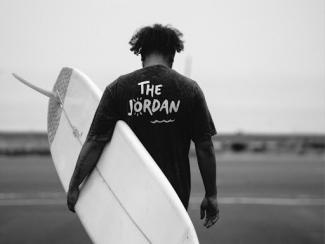
History books may not say so, but as early as the 1400s, our people were designing surf canoes that could slice through 10-foot-high waves. Some of the first known records of surfing, as we know it today, date from the 1640s in Ghana.
In the 1700s, accounts indicate that enslaved people surfed or surf-canoed everywhere from South Carolina to Brazil. Today, we’re still making waves in beautiful coastal communities around the world.
Ghana
In western Ghana, there is a thriving scene in the surf capital, Busua. Surf Ghana was founded there in 2016 as a collective using boardsports to empower and educate. It has now expanded by opening Surf House, a community hub.
Surf Ghana works with Busua’s surf schools, like Justice Brothers, to offer surf lessons to tourists and to support their youth training program, Obibini Girls, for young girls.
Senegal’s shores have produced some of the world’s best surfers. The Dakar surf community has been popping for years, with Copacabana Surf Village and Senesurf at the forefront. They offer lessons to surfers of all levels and work tirelessly to fight the pollution of the coastal waters of the Atlantic Ocean.
California
In Santa Cruz, Rhonda Harper, founder of Black Girls Surf, considers surfing a form of church. Her organization trains Black women and girls to become professional competitive athletes in the sport and hosts surf camps too.
Our people surfed first. Everyone else is riding our wave. Even if it's not on a surfboard, any way we connect with water is ancestral.